Theory of Nursing Care
VerifiedAdded on 2023/04/21
|8
|1951
|99
AI Summary
This document discusses the theory of nursing care and its application in practice. It includes a personal story of caring for a patient and explores the concepts of caring and its links with nursing practice. The document also highlights the importance of developing a therapeutic relationship with patients and providing patient-centered care. The standards of nursing practices set by the Nursing and Midwifery Board of Australia are also discussed.
Contribute Materials
Your contribution can guide someone’s learning journey. Share your
documents today.
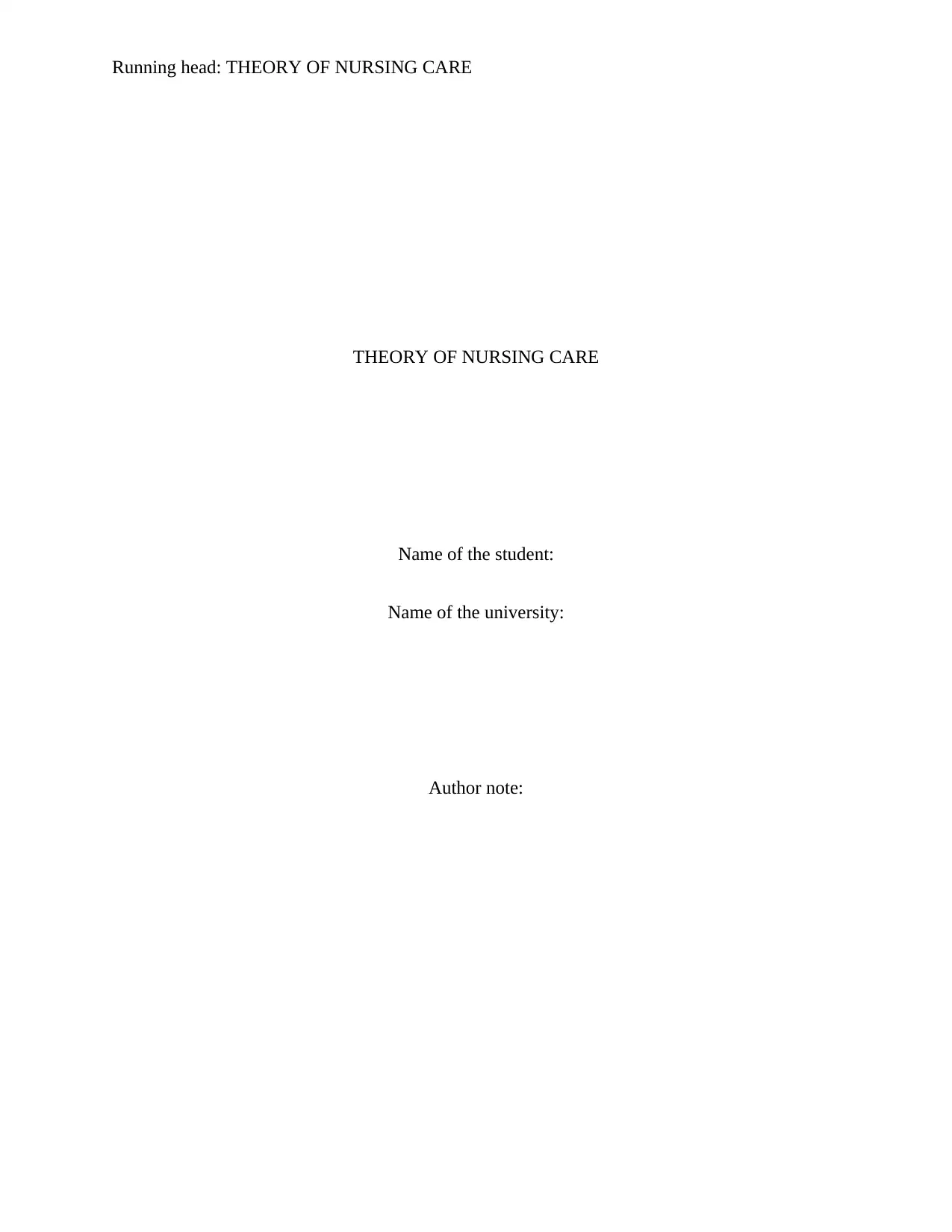
Running head: THEORY OF NURSING CARE
THEORY OF NURSING CARE
Name of the student:
Name of the university:
Author note:
THEORY OF NURSING CARE
Name of the student:
Name of the university:
Author note:
Secure Best Marks with AI Grader
Need help grading? Try our AI Grader for instant feedback on your assignments.
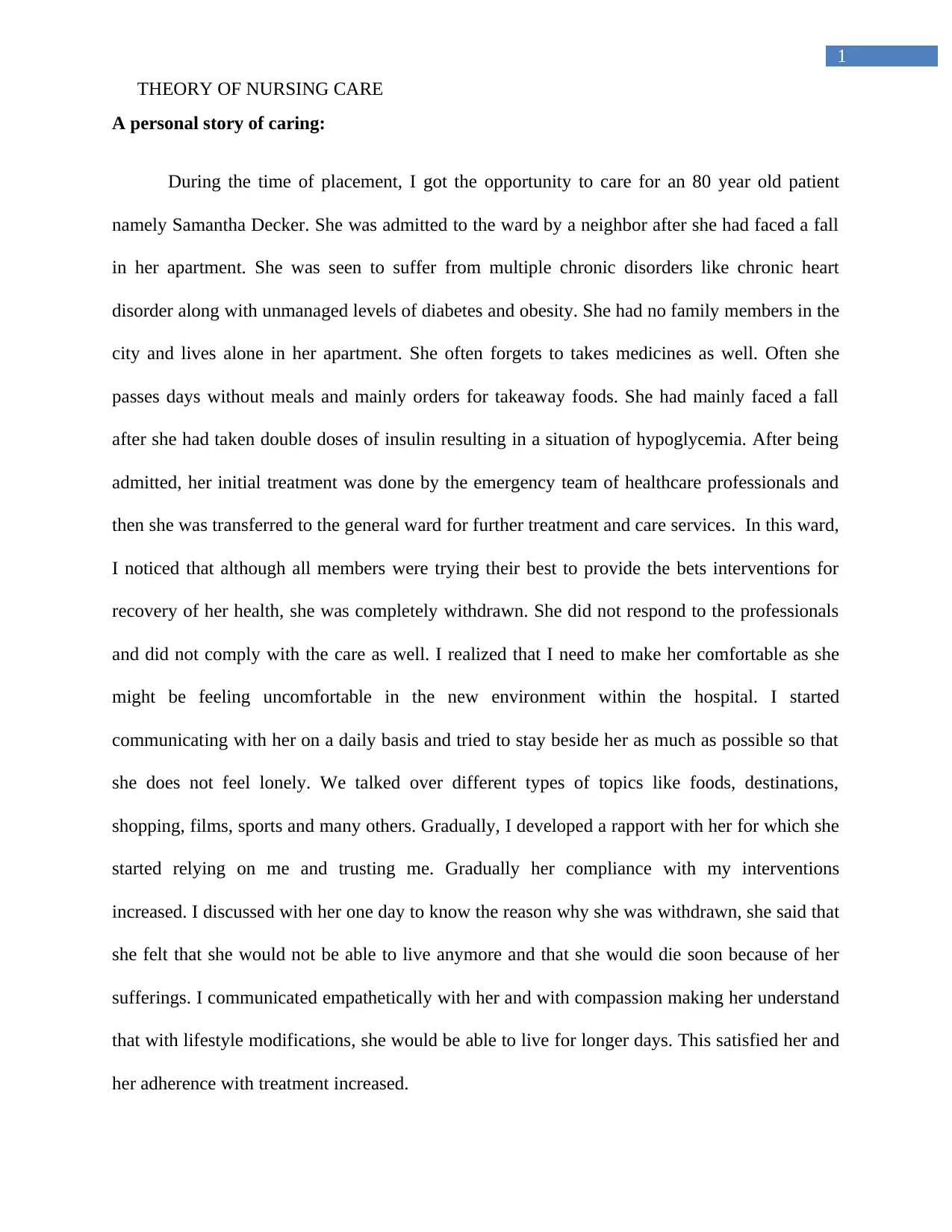
1
THEORY OF NURSING CARE
A personal story of caring:
During the time of placement, I got the opportunity to care for an 80 year old patient
namely Samantha Decker. She was admitted to the ward by a neighbor after she had faced a fall
in her apartment. She was seen to suffer from multiple chronic disorders like chronic heart
disorder along with unmanaged levels of diabetes and obesity. She had no family members in the
city and lives alone in her apartment. She often forgets to takes medicines as well. Often she
passes days without meals and mainly orders for takeaway foods. She had mainly faced a fall
after she had taken double doses of insulin resulting in a situation of hypoglycemia. After being
admitted, her initial treatment was done by the emergency team of healthcare professionals and
then she was transferred to the general ward for further treatment and care services. In this ward,
I noticed that although all members were trying their best to provide the bets interventions for
recovery of her health, she was completely withdrawn. She did not respond to the professionals
and did not comply with the care as well. I realized that I need to make her comfortable as she
might be feeling uncomfortable in the new environment within the hospital. I started
communicating with her on a daily basis and tried to stay beside her as much as possible so that
she does not feel lonely. We talked over different types of topics like foods, destinations,
shopping, films, sports and many others. Gradually, I developed a rapport with her for which she
started relying on me and trusting me. Gradually her compliance with my interventions
increased. I discussed with her one day to know the reason why she was withdrawn, she said that
she felt that she would not be able to live anymore and that she would die soon because of her
sufferings. I communicated empathetically with her and with compassion making her understand
that with lifestyle modifications, she would be able to live for longer days. This satisfied her and
her adherence with treatment increased.
THEORY OF NURSING CARE
A personal story of caring:
During the time of placement, I got the opportunity to care for an 80 year old patient
namely Samantha Decker. She was admitted to the ward by a neighbor after she had faced a fall
in her apartment. She was seen to suffer from multiple chronic disorders like chronic heart
disorder along with unmanaged levels of diabetes and obesity. She had no family members in the
city and lives alone in her apartment. She often forgets to takes medicines as well. Often she
passes days without meals and mainly orders for takeaway foods. She had mainly faced a fall
after she had taken double doses of insulin resulting in a situation of hypoglycemia. After being
admitted, her initial treatment was done by the emergency team of healthcare professionals and
then she was transferred to the general ward for further treatment and care services. In this ward,
I noticed that although all members were trying their best to provide the bets interventions for
recovery of her health, she was completely withdrawn. She did not respond to the professionals
and did not comply with the care as well. I realized that I need to make her comfortable as she
might be feeling uncomfortable in the new environment within the hospital. I started
communicating with her on a daily basis and tried to stay beside her as much as possible so that
she does not feel lonely. We talked over different types of topics like foods, destinations,
shopping, films, sports and many others. Gradually, I developed a rapport with her for which she
started relying on me and trusting me. Gradually her compliance with my interventions
increased. I discussed with her one day to know the reason why she was withdrawn, she said that
she felt that she would not be able to live anymore and that she would die soon because of her
sufferings. I communicated empathetically with her and with compassion making her understand
that with lifestyle modifications, she would be able to live for longer days. This satisfied her and
her adherence with treatment increased.
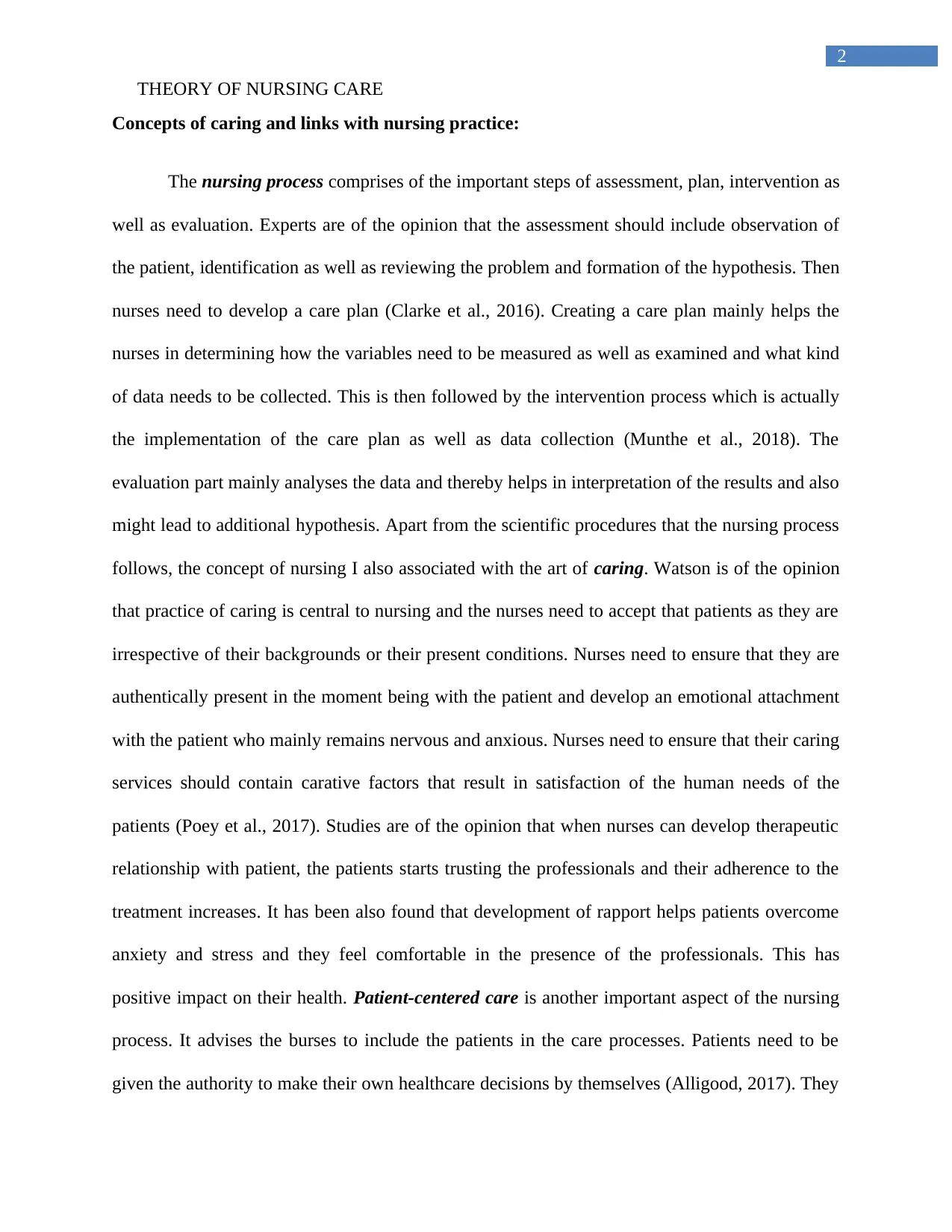
2
THEORY OF NURSING CARE
Concepts of caring and links with nursing practice:
The nursing process comprises of the important steps of assessment, plan, intervention as
well as evaluation. Experts are of the opinion that the assessment should include observation of
the patient, identification as well as reviewing the problem and formation of the hypothesis. Then
nurses need to develop a care plan (Clarke et al., 2016). Creating a care plan mainly helps the
nurses in determining how the variables need to be measured as well as examined and what kind
of data needs to be collected. This is then followed by the intervention process which is actually
the implementation of the care plan as well as data collection (Munthe et al., 2018). The
evaluation part mainly analyses the data and thereby helps in interpretation of the results and also
might lead to additional hypothesis. Apart from the scientific procedures that the nursing process
follows, the concept of nursing I also associated with the art of caring. Watson is of the opinion
that practice of caring is central to nursing and the nurses need to accept that patients as they are
irrespective of their backgrounds or their present conditions. Nurses need to ensure that they are
authentically present in the moment being with the patient and develop an emotional attachment
with the patient who mainly remains nervous and anxious. Nurses need to ensure that their caring
services should contain carative factors that result in satisfaction of the human needs of the
patients (Poey et al., 2017). Studies are of the opinion that when nurses can develop therapeutic
relationship with patient, the patients starts trusting the professionals and their adherence to the
treatment increases. It has been also found that development of rapport helps patients overcome
anxiety and stress and they feel comfortable in the presence of the professionals. This has
positive impact on their health. Patient-centered care is another important aspect of the nursing
process. It advises the burses to include the patients in the care processes. Patients need to be
given the authority to make their own healthcare decisions by themselves (Alligood, 2017). They
THEORY OF NURSING CARE
Concepts of caring and links with nursing practice:
The nursing process comprises of the important steps of assessment, plan, intervention as
well as evaluation. Experts are of the opinion that the assessment should include observation of
the patient, identification as well as reviewing the problem and formation of the hypothesis. Then
nurses need to develop a care plan (Clarke et al., 2016). Creating a care plan mainly helps the
nurses in determining how the variables need to be measured as well as examined and what kind
of data needs to be collected. This is then followed by the intervention process which is actually
the implementation of the care plan as well as data collection (Munthe et al., 2018). The
evaluation part mainly analyses the data and thereby helps in interpretation of the results and also
might lead to additional hypothesis. Apart from the scientific procedures that the nursing process
follows, the concept of nursing I also associated with the art of caring. Watson is of the opinion
that practice of caring is central to nursing and the nurses need to accept that patients as they are
irrespective of their backgrounds or their present conditions. Nurses need to ensure that they are
authentically present in the moment being with the patient and develop an emotional attachment
with the patient who mainly remains nervous and anxious. Nurses need to ensure that their caring
services should contain carative factors that result in satisfaction of the human needs of the
patients (Poey et al., 2017). Studies are of the opinion that when nurses can develop therapeutic
relationship with patient, the patients starts trusting the professionals and their adherence to the
treatment increases. It has been also found that development of rapport helps patients overcome
anxiety and stress and they feel comfortable in the presence of the professionals. This has
positive impact on their health. Patient-centered care is another important aspect of the nursing
process. It advises the burses to include the patients in the care processes. Patients need to be
given the authority to make their own healthcare decisions by themselves (Alligood, 2017). They
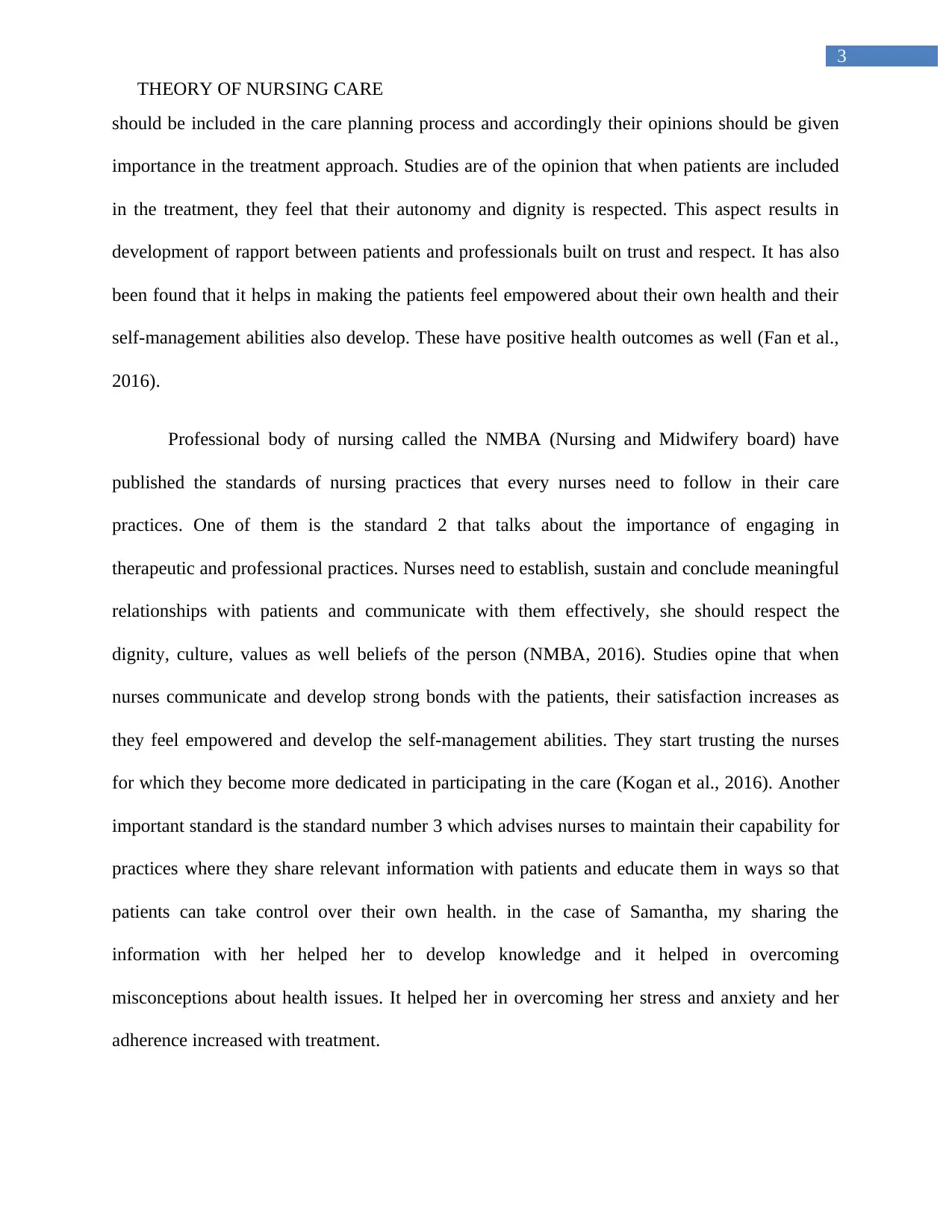
3
THEORY OF NURSING CARE
should be included in the care planning process and accordingly their opinions should be given
importance in the treatment approach. Studies are of the opinion that when patients are included
in the treatment, they feel that their autonomy and dignity is respected. This aspect results in
development of rapport between patients and professionals built on trust and respect. It has also
been found that it helps in making the patients feel empowered about their own health and their
self-management abilities also develop. These have positive health outcomes as well (Fan et al.,
2016).
Professional body of nursing called the NMBA (Nursing and Midwifery board) have
published the standards of nursing practices that every nurses need to follow in their care
practices. One of them is the standard 2 that talks about the importance of engaging in
therapeutic and professional practices. Nurses need to establish, sustain and conclude meaningful
relationships with patients and communicate with them effectively, she should respect the
dignity, culture, values as well beliefs of the person (NMBA, 2016). Studies opine that when
nurses communicate and develop strong bonds with the patients, their satisfaction increases as
they feel empowered and develop the self-management abilities. They start trusting the nurses
for which they become more dedicated in participating in the care (Kogan et al., 2016). Another
important standard is the standard number 3 which advises nurses to maintain their capability for
practices where they share relevant information with patients and educate them in ways so that
patients can take control over their own health. in the case of Samantha, my sharing the
information with her helped her to develop knowledge and it helped in overcoming
misconceptions about health issues. It helped her in overcoming her stress and anxiety and her
adherence increased with treatment.
THEORY OF NURSING CARE
should be included in the care planning process and accordingly their opinions should be given
importance in the treatment approach. Studies are of the opinion that when patients are included
in the treatment, they feel that their autonomy and dignity is respected. This aspect results in
development of rapport between patients and professionals built on trust and respect. It has also
been found that it helps in making the patients feel empowered about their own health and their
self-management abilities also develop. These have positive health outcomes as well (Fan et al.,
2016).
Professional body of nursing called the NMBA (Nursing and Midwifery board) have
published the standards of nursing practices that every nurses need to follow in their care
practices. One of them is the standard 2 that talks about the importance of engaging in
therapeutic and professional practices. Nurses need to establish, sustain and conclude meaningful
relationships with patients and communicate with them effectively, she should respect the
dignity, culture, values as well beliefs of the person (NMBA, 2016). Studies opine that when
nurses communicate and develop strong bonds with the patients, their satisfaction increases as
they feel empowered and develop the self-management abilities. They start trusting the nurses
for which they become more dedicated in participating in the care (Kogan et al., 2016). Another
important standard is the standard number 3 which advises nurses to maintain their capability for
practices where they share relevant information with patients and educate them in ways so that
patients can take control over their own health. in the case of Samantha, my sharing the
information with her helped her to develop knowledge and it helped in overcoming
misconceptions about health issues. It helped her in overcoming her stress and anxiety and her
adherence increased with treatment.
Secure Best Marks with AI Grader
Need help grading? Try our AI Grader for instant feedback on your assignments.
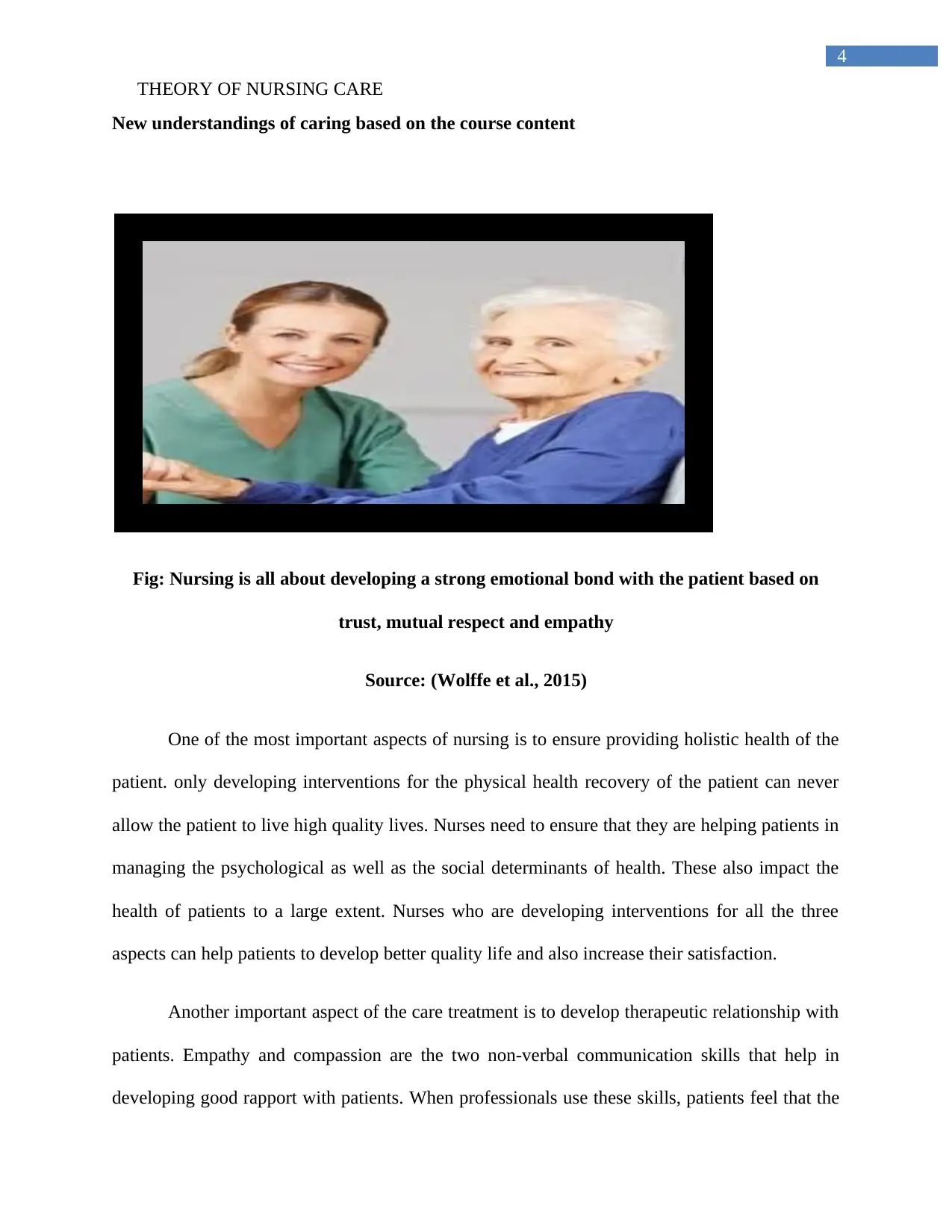
4
THEORY OF NURSING CARE
New understandings of caring based on the course content
Fig: Nursing is all about developing a strong emotional bond with the patient based on
trust, mutual respect and empathy
Source: (Wolffe et al., 2015)
One of the most important aspects of nursing is to ensure providing holistic health of the
patient. only developing interventions for the physical health recovery of the patient can never
allow the patient to live high quality lives. Nurses need to ensure that they are helping patients in
managing the psychological as well as the social determinants of health. These also impact the
health of patients to a large extent. Nurses who are developing interventions for all the three
aspects can help patients to develop better quality life and also increase their satisfaction.
Another important aspect of the care treatment is to develop therapeutic relationship with
patients. Empathy and compassion are the two non-verbal communication skills that help in
developing good rapport with patients. When professionals use these skills, patients feel that the
THEORY OF NURSING CARE
New understandings of caring based on the course content
Fig: Nursing is all about developing a strong emotional bond with the patient based on
trust, mutual respect and empathy
Source: (Wolffe et al., 2015)
One of the most important aspects of nursing is to ensure providing holistic health of the
patient. only developing interventions for the physical health recovery of the patient can never
allow the patient to live high quality lives. Nurses need to ensure that they are helping patients in
managing the psychological as well as the social determinants of health. These also impact the
health of patients to a large extent. Nurses who are developing interventions for all the three
aspects can help patients to develop better quality life and also increase their satisfaction.
Another important aspect of the care treatment is to develop therapeutic relationship with
patients. Empathy and compassion are the two non-verbal communication skills that help in
developing good rapport with patients. When professionals use these skills, patients feel that the
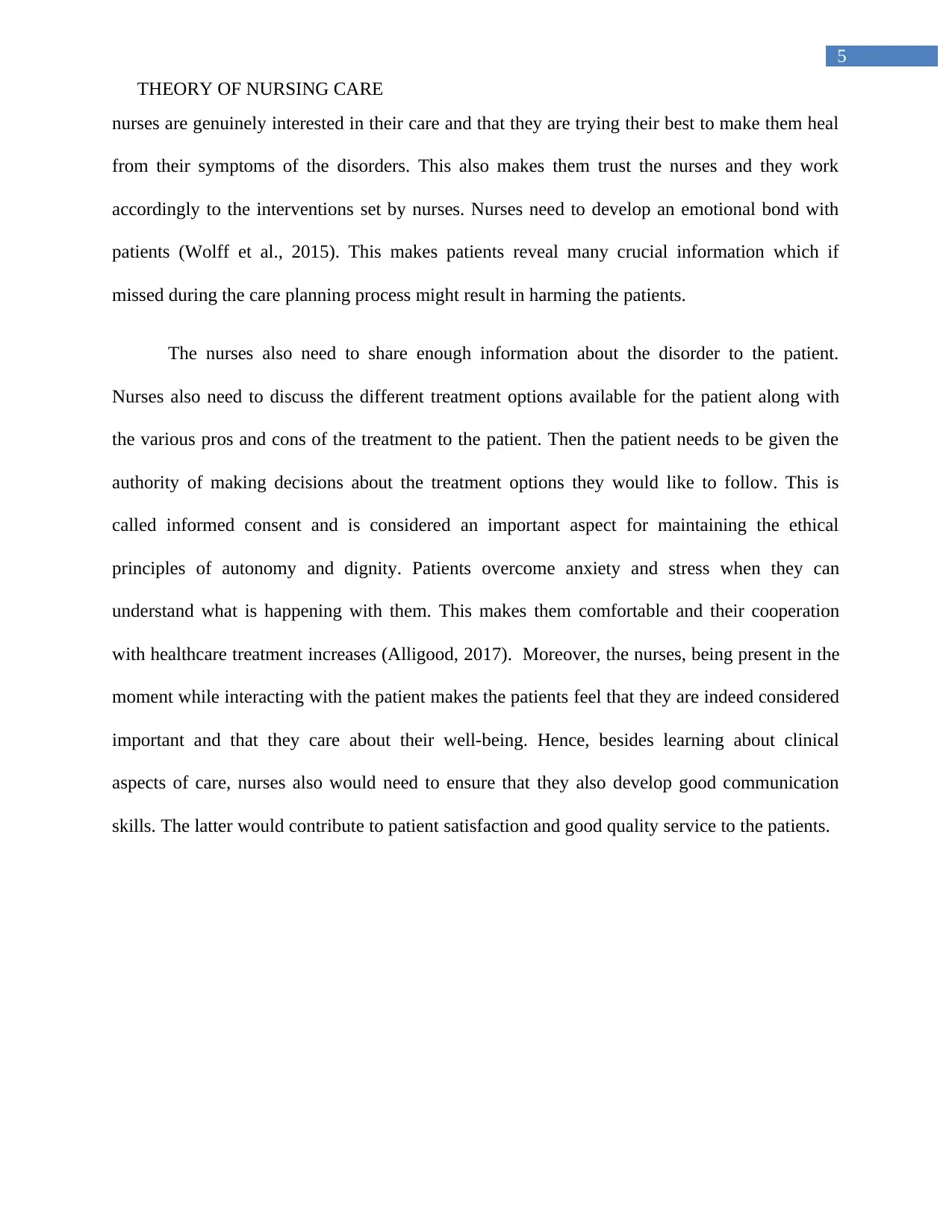
5
THEORY OF NURSING CARE
nurses are genuinely interested in their care and that they are trying their best to make them heal
from their symptoms of the disorders. This also makes them trust the nurses and they work
accordingly to the interventions set by nurses. Nurses need to develop an emotional bond with
patients (Wolff et al., 2015). This makes patients reveal many crucial information which if
missed during the care planning process might result in harming the patients.
The nurses also need to share enough information about the disorder to the patient.
Nurses also need to discuss the different treatment options available for the patient along with
the various pros and cons of the treatment to the patient. Then the patient needs to be given the
authority of making decisions about the treatment options they would like to follow. This is
called informed consent and is considered an important aspect for maintaining the ethical
principles of autonomy and dignity. Patients overcome anxiety and stress when they can
understand what is happening with them. This makes them comfortable and their cooperation
with healthcare treatment increases (Alligood, 2017). Moreover, the nurses, being present in the
moment while interacting with the patient makes the patients feel that they are indeed considered
important and that they care about their well-being. Hence, besides learning about clinical
aspects of care, nurses also would need to ensure that they also develop good communication
skills. The latter would contribute to patient satisfaction and good quality service to the patients.
THEORY OF NURSING CARE
nurses are genuinely interested in their care and that they are trying their best to make them heal
from their symptoms of the disorders. This also makes them trust the nurses and they work
accordingly to the interventions set by nurses. Nurses need to develop an emotional bond with
patients (Wolff et al., 2015). This makes patients reveal many crucial information which if
missed during the care planning process might result in harming the patients.
The nurses also need to share enough information about the disorder to the patient.
Nurses also need to discuss the different treatment options available for the patient along with
the various pros and cons of the treatment to the patient. Then the patient needs to be given the
authority of making decisions about the treatment options they would like to follow. This is
called informed consent and is considered an important aspect for maintaining the ethical
principles of autonomy and dignity. Patients overcome anxiety and stress when they can
understand what is happening with them. This makes them comfortable and their cooperation
with healthcare treatment increases (Alligood, 2017). Moreover, the nurses, being present in the
moment while interacting with the patient makes the patients feel that they are indeed considered
important and that they care about their well-being. Hence, besides learning about clinical
aspects of care, nurses also would need to ensure that they also develop good communication
skills. The latter would contribute to patient satisfaction and good quality service to the patients.
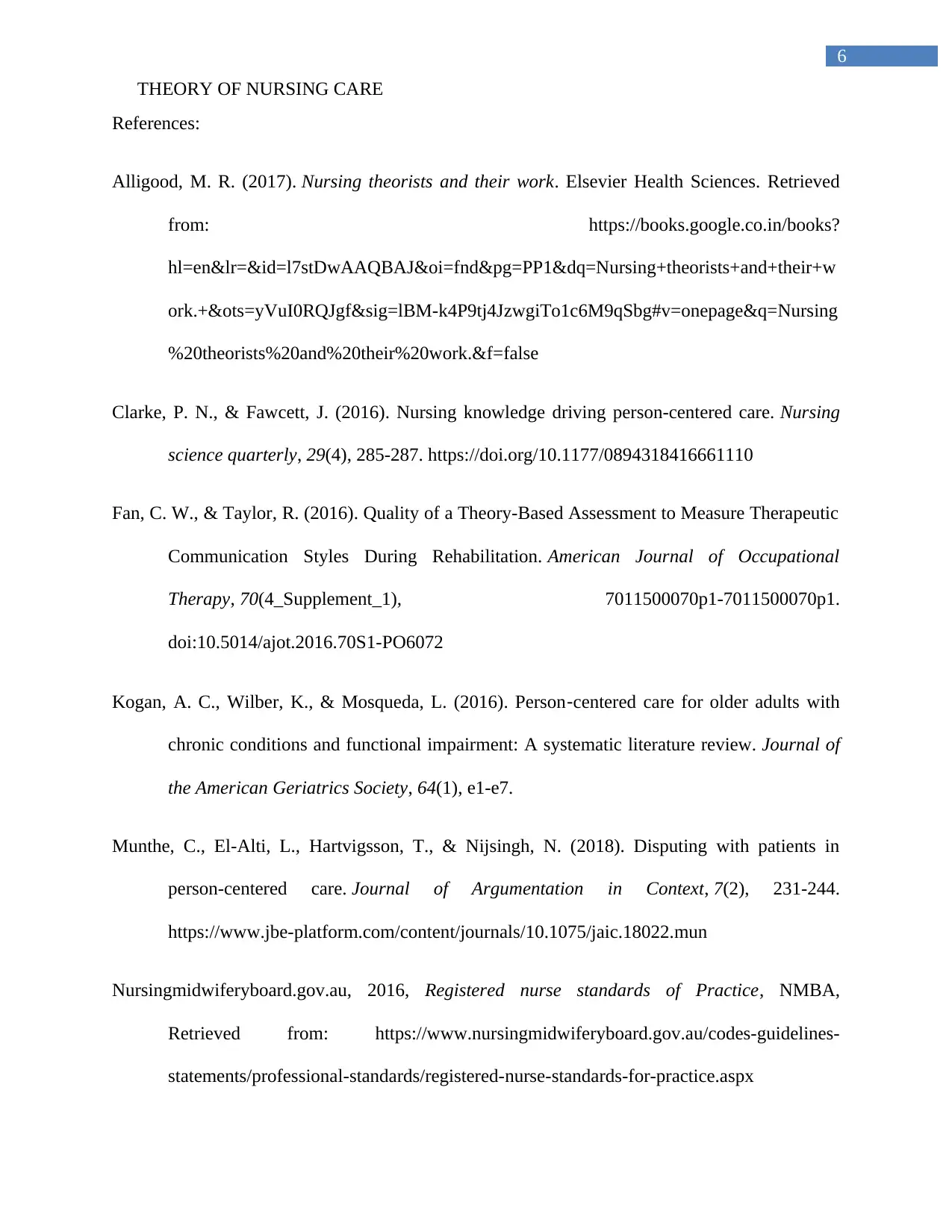
6
THEORY OF NURSING CARE
References:
Alligood, M. R. (2017). Nursing theorists and their work. Elsevier Health Sciences. Retrieved
from: https://books.google.co.in/books?
hl=en&lr=&id=l7stDwAAQBAJ&oi=fnd&pg=PP1&dq=Nursing+theorists+and+their+w
ork.+&ots=yVuI0RQJgf&sig=lBM-k4P9tj4JzwgiTo1c6M9qSbg#v=onepage&q=Nursing
%20theorists%20and%20their%20work.&f=false
Clarke, P. N., & Fawcett, J. (2016). Nursing knowledge driving person-centered care. Nursing
science quarterly, 29(4), 285-287. https://doi.org/10.1177/0894318416661110
Fan, C. W., & Taylor, R. (2016). Quality of a Theory-Based Assessment to Measure Therapeutic
Communication Styles During Rehabilitation. American Journal of Occupational
Therapy, 70(4_Supplement_1), 7011500070p1-7011500070p1.
doi:10.5014/ajot.2016.70S1-PO6072
Kogan, A. C., Wilber, K., & Mosqueda, L. (2016). Person‐centered care for older adults with
chronic conditions and functional impairment: A systematic literature review. Journal of
the American Geriatrics Society, 64(1), e1-e7.
Munthe, C., El-Alti, L., Hartvigsson, T., & Nijsingh, N. (2018). Disputing with patients in
person-centered care. Journal of Argumentation in Context, 7(2), 231-244.
https://www.jbe-platform.com/content/journals/10.1075/jaic.18022.mun
Nursingmidwiferyboard.gov.au, 2016, Registered nurse standards of Practice, NMBA,
Retrieved from: https://www.nursingmidwiferyboard.gov.au/codes-guidelines-
statements/professional-standards/registered-nurse-standards-for-practice.aspx
THEORY OF NURSING CARE
References:
Alligood, M. R. (2017). Nursing theorists and their work. Elsevier Health Sciences. Retrieved
from: https://books.google.co.in/books?
hl=en&lr=&id=l7stDwAAQBAJ&oi=fnd&pg=PP1&dq=Nursing+theorists+and+their+w
ork.+&ots=yVuI0RQJgf&sig=lBM-k4P9tj4JzwgiTo1c6M9qSbg#v=onepage&q=Nursing
%20theorists%20and%20their%20work.&f=false
Clarke, P. N., & Fawcett, J. (2016). Nursing knowledge driving person-centered care. Nursing
science quarterly, 29(4), 285-287. https://doi.org/10.1177/0894318416661110
Fan, C. W., & Taylor, R. (2016). Quality of a Theory-Based Assessment to Measure Therapeutic
Communication Styles During Rehabilitation. American Journal of Occupational
Therapy, 70(4_Supplement_1), 7011500070p1-7011500070p1.
doi:10.5014/ajot.2016.70S1-PO6072
Kogan, A. C., Wilber, K., & Mosqueda, L. (2016). Person‐centered care for older adults with
chronic conditions and functional impairment: A systematic literature review. Journal of
the American Geriatrics Society, 64(1), e1-e7.
Munthe, C., El-Alti, L., Hartvigsson, T., & Nijsingh, N. (2018). Disputing with patients in
person-centered care. Journal of Argumentation in Context, 7(2), 231-244.
https://www.jbe-platform.com/content/journals/10.1075/jaic.18022.mun
Nursingmidwiferyboard.gov.au, 2016, Registered nurse standards of Practice, NMBA,
Retrieved from: https://www.nursingmidwiferyboard.gov.au/codes-guidelines-
statements/professional-standards/registered-nurse-standards-for-practice.aspx
Paraphrase This Document
Need a fresh take? Get an instant paraphrase of this document with our AI Paraphraser
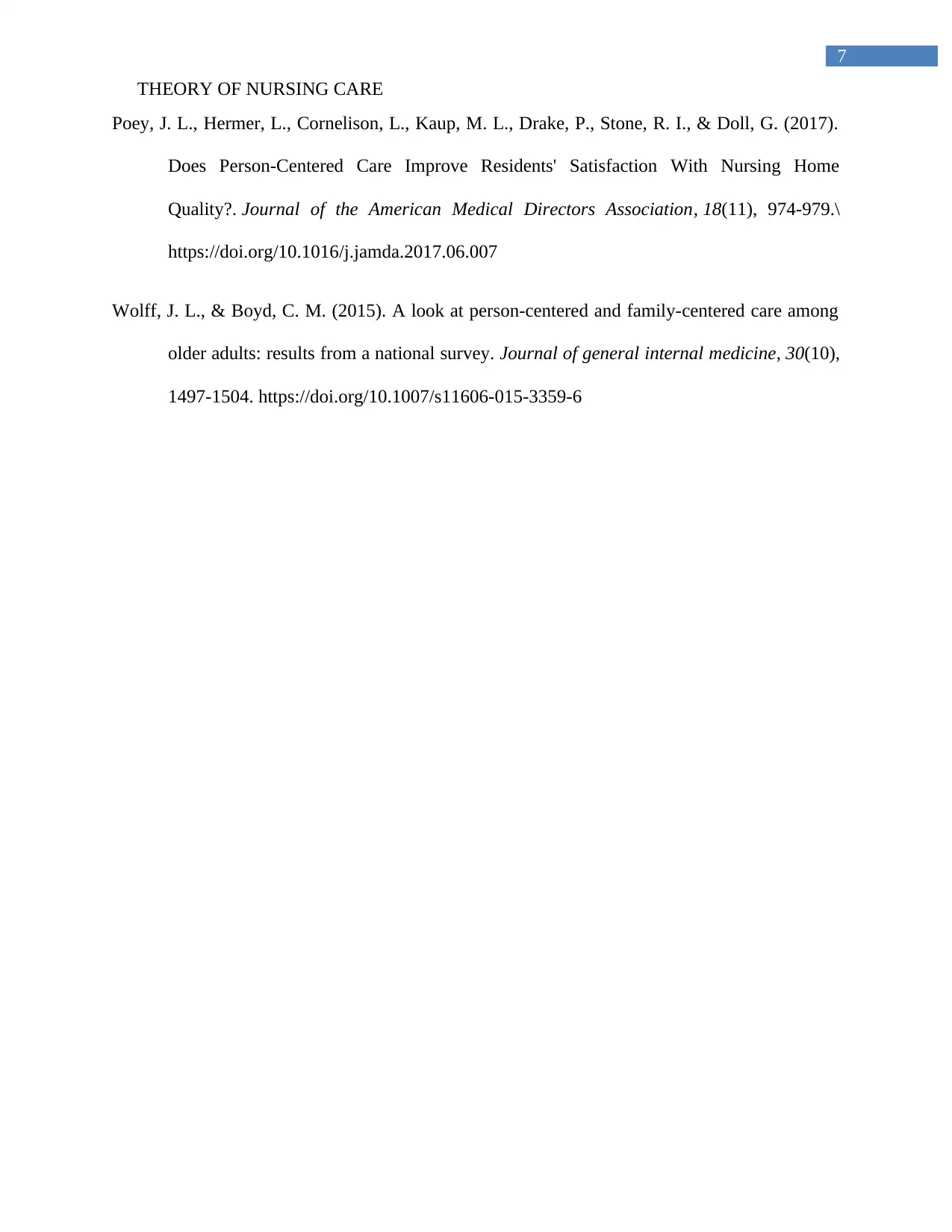
7
THEORY OF NURSING CARE
Poey, J. L., Hermer, L., Cornelison, L., Kaup, M. L., Drake, P., Stone, R. I., & Doll, G. (2017).
Does Person-Centered Care Improve Residents' Satisfaction With Nursing Home
Quality?. Journal of the American Medical Directors Association, 18(11), 974-979.\
https://doi.org/10.1016/j.jamda.2017.06.007
Wolff, J. L., & Boyd, C. M. (2015). A look at person-centered and family-centered care among
older adults: results from a national survey. Journal of general internal medicine, 30(10),
1497-1504. https://doi.org/10.1007/s11606-015-3359-6
THEORY OF NURSING CARE
Poey, J. L., Hermer, L., Cornelison, L., Kaup, M. L., Drake, P., Stone, R. I., & Doll, G. (2017).
Does Person-Centered Care Improve Residents' Satisfaction With Nursing Home
Quality?. Journal of the American Medical Directors Association, 18(11), 974-979.\
https://doi.org/10.1016/j.jamda.2017.06.007
Wolff, J. L., & Boyd, C. M. (2015). A look at person-centered and family-centered care among
older adults: results from a national survey. Journal of general internal medicine, 30(10),
1497-1504. https://doi.org/10.1007/s11606-015-3359-6
1 out of 8
Related Documents
Your All-in-One AI-Powered Toolkit for Academic Success.
+13062052269
info@desklib.com
Available 24*7 on WhatsApp / Email
![[object Object]](/_next/static/media/star-bottom.7253800d.svg)
Unlock your academic potential
© 2024 | Zucol Services PVT LTD | All rights reserved.





